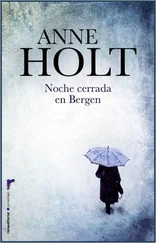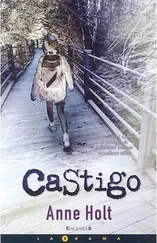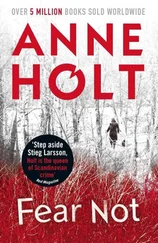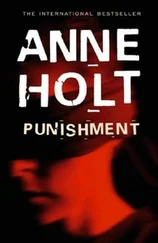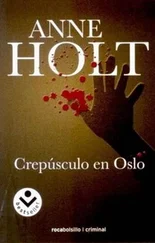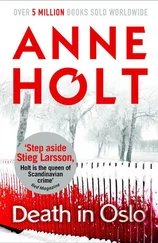They’d eaten their meal by the time she’d finished talking. Nils began clearing the table, without seeming uninterested in her story. Karen sat down in an armchair, reclined the seat, and heard him loading the dishwasher. Eventually the rattling was accompanied by the gurgle of the coffee percolator.
“He’s clearly scared to death,” he shouted from the kitchen, then looked into the living room and reiterated it, “I think he’s bloody scared of someone.”
Brilliant. As if it wasn’t obvious. Typical of Nils, he had an ability to come out with self-evident comments that for many years she’d found appealing, almost as if he were being deliberately sardonic. But lately she’d come to realise that he actually thought he could perceive what others couldn’t.
“Of course he’s scared,” she murmured to herself, “but what is it he’s scared of?” Nils came in with two cups of coffee.
“Well, he’s clearly not afraid of the police,” she said as she took the cup. “He wanted to be arrested. Just sat right down in a busy street and waited for them to arrive. But why wouldn’t he say anything, why wouldn’t he admit he’d killed the man by the River Aker? Why is he afraid of prison if he’s not afraid of the police? And why of all things should he insist on having me as his lawyer?”
Nils shrugged his shoulders and picked up a newspaper.
“You’ll find out eventually,” he said, becoming engrossed in the comic strips.
Karen shut her eyes.
“I’ll find out eventually,” she repeated to herself, and yawned as she stroked the dog behind the ear.
Karen Borg had had a restless night. Not in itself an unusual occurrence. She was always tired in the evenings, and fell asleep within minutes of going to bed. The problem was that she always woke up again. Mostly at about five o’clock in the morning. She would still be tired and heavy with sleep, but incapable of drifting back into the world of dreams. Her problems seemed immense at night, even the ones that by day were little more than fleeting shadows. Things that were so easy to play down in the light of day as mundane, unthreatening, or mere irritations, became in this transition period before dawn pervasive menacing spectres looming over her. All too often she would lie there twisting and turning until half past six or so, and then drop into a deep unconscious sleep until the alarm clock jerked her out of it only half an hour later.
Last night she’d woken at two, drenched in sweat. She’d been sitting in an aeroplane with no floor, and the passengers were having to balance without safety belts on little projections attached to the aircraft walls. After clinging on tight until she was faint from exhaustion, she felt the plane go into a sudden steep descent towards the ground. She woke as it crashed into a hill. Dreams about plane crashes were supposed to be a sign of lack of control over one’s life. But she didn’t feel that could apply to her.
It was a bright autumn day for once. It had been pouring with rain all week, but last night the temperature had risen to fifteen degrees Celsius, and the sun was making a final effort to remind everyone that it was not so very long since summer after all. The trees on Olaf Ryes Plass were already turning reddish yellow, and the light was so strong that even the Pakistani shopkeepers looked pale as they set up their wares on the street outside their kiosks and grocery shops. There was a roar of traffic from Toftes Gata, but the air smelt surprisingly fresh and clean.
When Karen had become the youngest-and only female-partner in Greverud & Co. five years previously, she and Nils had seriously discussed leaving the Grünerløkka area. They could easily afford to, and Grünerløkka hadn’t developed the way everyone was anticipating at the time she acquired a flat in a block then under threat of demolition but reprieved by the Oslo City Renovation Project. The rescue had been a halfhearted attempt at restoration, at an insane cost, and resulted in a fifteen-fold rent increase in three years. The least well-off had to move out, and had it not been for the fact that the creditors had nothing to gain by forcing the whole property company into liquidation, it might have been disastrous. But Karen had sold the flat at the right time, just before the big property crash in 1987, and had emerged with a reasonable sum for her new abode, a loft apartment in the adjoining block, which had miraculously escaped the Renovation Project because the residents had themselves undertaken to carry out the City Council’s area conservation plans.
Karen and Nils had really set their hearts on moving. But late one extraordinary Saturday night a year or so ago they had sat down and analysed their motives. They compiled a list of pros and cons, as if preparing an answer to an examination question. They ultimately concluded that they should use the money to extend their little flat instead. They strengthened the housing association’s finances by purchasing the remainder of the loft, almost 200 square metres. It was very luxurious by the time it was completed and had risen enormously in value. They had never regretted it. When they’d both come to accept with remarkable equanimity that they would not have children, a tacit admission that had developed between them by the time they had been abstaining from contraception for four or five years without it leading to anything, they had started to forget all their friends’ arguments about the pollution in Oslo city centre. They had a terrace with a Jacuzzi and barbecue, no gardening to do, and could walk to the nearest cinema without too much exertion. Even though they had a car, a Ford Sierra bought secondhand in view of the inadvisability of investing too heavily in a vehicle that would be parked in the street, they mostly used the tram or went on foot.
Karen had grown up in the pleasant residential district of Kalfaret in Bergen. It had been a childhood spent under the surveillance of the sophisticated local intelligence services, with agents peering out from behind curtains, always fully informed of everyone’s slightest misdemeanours, from unwashed floors to extra-marital affairs. After a weekend visit home a couple of times a year Karen would be seized by a feeling of unbearable claustrophobia that she couldn’t entirely account for, especially as she herself had never had anything to hide.
So Grünerløkka for her was a place of refuge. She and Nils had stayed put, and now had no intention of ever moving.
She paused in front of the little kiosk opposite the tram stop. The tabloid newspapers were piled high in their respective stands.
“Brutal drugs murder shakes police.” The headline leapt out at her. She picked up a copy, went in reading it, and put the money on the counter with hardly a glance at the man behind the counter. The tram arrived as she came out. She stamped her ticket and sat down on a folding seat. The front page referred her to page five. Beneath a photograph of the corpse that she herself had found only four days ago, the text stated that “The police believe the brutal murder of an as-yet-unidentified man in his thirties to be a revenge killing in the drugs world.”
No sources were given. The story was uncannily close to what Håkon Sand had told her.
She was infuriated. Håkon had emphasised that what had been said between them was not to go any further. The caution had been completely superfluous; there was no one Karen had less time for than journalists. She was all the more annoyed by the police’s own bungling.
She wondered about her client. Would he get newspapers in his cell? No, he’d accepted a ban on letters and visits, and she seemed to recall that it also included a ban on newspapers, TV, and radio. But she wasn’t sure.
Читать дальше




